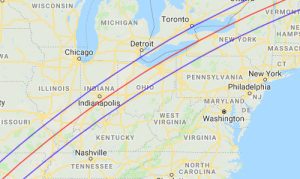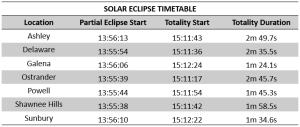| On Monday, April 8, 2024, people in Delaware County and other areas within a 124-mile-wide swath of Ohio will experience the totality of a solar eclipse. State planners anticipate that those traveling to and through Delaware County on the day of the eclipse could double the county’s population.
The Delaware County Office of Homeland Security and Emergency Management is working with a variety of governmental and private-sector stakeholders to ensure that plans are in place to address this influx of visitors and the potential strain on resources and emergency response services. On the day of the eclipse, operational updates will be posted here as well as on Delaware County’s social media accounts on Facebook, Twitter/X, Instagram and Threads. |

|
| OPERATIONAL UPDATES on April 8, 2024 |
| 1:55 p.m. – The partial eclipse has begun in Delaware County.
Traffic information: 11:17 a.m. FROM TROY TOWNSHIP (north of Delaware city):
Communication congestion and 9-1-1 text option With an influx of people comes the potential for strain on communication infrastructure, including cellular service. In the event cellular service is diminished, please remember that the Delaware County 9-1-1 dispatch center can also be contacted by text message. While calling 9-1-1 during an emergency is preferred, dispatchers are able to respond to messages received via text. |
FREQUENTLY ASKED QUESTIONS:
Residents
How can I view the eclipse safely?
It is never safe to look directly at the sun’s rays, even if the sun is partially obscured.
The only safe way to look directly at a partially eclipsed sun is through special-purpose solar filters, such as eclipse glasses or hand-held solar viewers.
Please consult guides for safely viewing the eclipse created by the Ohio Emergency Management Agency and Perkins Observatory.
What can I do to start preparing for potential traffic impacts on April 8, 2024?
State planners anticipate that those travelling to and through Delaware County on the day of the eclipse could double the county’s population.
Delaware County EMA is working with a variety of governmental and private-sector stakeholders to ensure that plans are in place to address this influx of visitors and the potential strain on resources and emergency response services.
Start planning ahead by considering the following:
- Does your schedule on April 8, 2024, allow for the potential increase in local travel times?
- Will you have the amenities you need before the event? Can you order supplies ahead or have them delivered on a different day?
- Given the potential traffic implications, some Delaware County school districts will operate under distance-learning plans on April 8, 2024. Other schools have decided to close on the day of the eclipse. Do you need to arrange for childcare?
What do motorists need to know about traveling on the day of the eclipse?
Before hitting the road, consider the following:
- Pre-plan your route. Know your destination in advance and where you plan to safely park to view the eclipse.
- Do not pull off the side of a roadway to view the eclipse, as this is unsafe and could impede traffic.
- Do not park on privately owned land (empty lots or farm fields) unless arrangements have been made with the owner of the property.
- Consider keeping a paper map in your preparedness kit.
- Top off your gas tank a few days before the event.
- If it is a rainy week prior to the eclipse, be mindful of parking in grassy areas such as fields. The ground may be soft and your vehicle may get stuck in the mud.
- Ohio’s Move Over Law requires motorists to cautiously shift over one lane – or slow down if changing lanes is not possible – when passing any vehicle with flashing lights on the side of a road.
- Do not call 9-1-1 for traffic jams unless it is a life-safety emergency. In the event cellular service is diminished, please remember that the Delaware County 9-1-1 dispatch center can also be contacted by text message. While calling 9-1-1 during an emergency is preferred, dispatchers are be able to respond to messages received via text.
Are there any other safety considerations for boaters?
If you plan to take in the event from the water, consider the following:
- Water temperatures on Lake Erie in early April average in the upper 30s to low 40s. Water temperatures below 55 can cause cold water shock, leading to death within one minute of falling into the cold water. Without a dry suit, survival of more than five minutes is unlikely due to hypothermia. The average death rate for boating accidents is 45% when the water temperature is colder than 50 but only 11% when the water temperature is between 70 and 79.
- Ohio follows federal rules for life jackets and flotation devices for boating. Click here to learn more.
- Signs of cold water shock are gasping for breath, rapid breathing, sudden spike in heart rate and blood pressure, and cognitive impairment.
- Historically, the Lake Erie water temperature offshore of Cleveland on April 8 averages 39 degrees.
Visitors
Where can I stay in Delaware County?
Plan to make reservations early. Area hotels have already seen an influx of bookings on days surrounding the eclipse.
Destination Delaware County has compiled the following lists of lodging options:
What else can I do during my trip?
As there may be heavy traffic on the day of the eclipse, visitors are invited to come early and stay late. While you’re here, take in the big-time attractions and small-town charm that Delaware County offers. Destination Delaware County has compiled guides of things to do and places to eat.
How can I view the eclipse safely?
It is never safe to look directly at the sun’s rays, even if the sun is partially obscured.
The only safe way to look directly at a partially eclipsed sun is through special-purpose solar filters, such as eclipse glasses or hand-held solar viewers.
Please consult guides for safely viewing the eclipse created by the Ohio Emergency Management Agency and Perkins Observatory.
What do motorists need to know about traveling on the day of the eclipse?
Before hitting the road, consider the following:
- Pre-plan your route. Know your destination in advance and where you plan to safely park to view the eclipse.
- Do not pull off the side of a roadway to view the eclipse, as this is unsafe and could impede traffic.
- Do not park on privately owned land (empty lots or farm fields) unless arrangements have been made with the owner of the property.
- Consider keeping a paper map in your preparedness kit.
- Top off your gas tank a few days before the event.
- If it is a rainy week prior to the eclipse, be mindful of parking in grassy areas such as fields. The ground may be soft and your vehicle may get stuck in the mud.
- Ohio’s Move Over Law requires motorists to cautiously shift over one lane – or slow down if changing lanes is not possible – when passing any vehicle with flashing lights on the side of a road.
- Do not call 9-1-1 for traffic jams unless it is a life-safety emergency. In the event cellular service is diminished, please remember that the Delaware County 9-1-1 dispatch center can also be contacted by text message. While calling 9-1-1 during an emergency is preferred, dispatchers are be able to respond to messages received via text.
Are there any other safety considerations for boaters?
If you plan to take in the event from the water, consider the following:
- Water temperatures on Lake Erie in early April average in the upper 30s to low 40s. Water temperatures below 55 can cause cold water shock, leading to death within one minute of falling into the cold water. Without a dry suit, survival of more than five minutes is unlikely due to hypothermia. The average death rate for boating accidents is 45% when the water temperature is colder than 50 but only 11% when the water temperature is between 70 and 79.
- Ohio follows federal rules for life jackets and flotation devices for boating. Click here to learn more.
- Signs of cold water shock are gasping for breath, rapid breathing, sudden spike in heart rate and blood pressure, and cognitive impairment.
- Historically, the Lake Erie water temperature offshore of Cleveland on April 8 averages 39 degrees.
Schools and Businesses
Will school schedules be impacted by the eclipse?
Given the potential traffic implications, some Delaware County school districts will operate under distance-learning plans on April 8, 2024. Other schools have decided to close on the day of the eclipse. Please contact individual school districts directly for details.
How will the potential influx of visitors impact my business?
Many people are expected to travel to Delaware County to view the eclipse, and area hotels have already seen an influx of bookings on days surrounding the eclipse. Delaware County and the State of Ohio are encouraging people to come early and stay late, as there will likely be heavy traffic on the day of the event. Patrons, employees and others may experience increased travel times on the day of the eclipse, and businesses should plan ahead to reduce operational impacts.
- Patrons, employees and others may experience increased travel times on the day of the eclipse. Does your schedule on April 8, 2024, allow for the potential increase in local travel times? Do you need to increase staffing to accommodate the influx of visitors to Delaware County?
- Amenities including food and fuel may experience increased demand that leads to shortages. Do you need additional supplies or stock to account for the potential increase in demand? Will you have the amenities you need before the event? Can you order supplies ahead or have them delivered on a different day?
Food Vendors and Campgrounds
Is my venue a temporary campground? If so, do I need a permit?
If visitors will be permitted to park recreational vehicles or set up portable camping units on your property, please consult the guide to temporary campground requirements and contact the Delaware Public Health District at 740-368-1700.
Do I need a temporary license to serve food at my event? How can I verify that a food vendor is licensed?
Many situational circumstances determine if a temporary food permit is required. Please consult the guide to food licenses and contact the Delaware Public Health District at 740-368-1700. If you plan to hire a food truck for your event, the guide also details how to check a vendor’s license.
When do I need to have plans in place for camping and food service during the eclipse?
Applications for temporary food permits must be submitted at least 10 days prior to the event.
Those operating temporary campgrounds should have plans in place by the end of February at the latest. The Delaware Public Health District requests at least 21 days to schedule and conduct a site evaluation. The evaluation must be conducted before to the permit application deadline, which is 15 days prior to the event.
Please review the guide to temporary food and temporary campground permits and contact the Delaware Public Health District at 740-368-1700 with any questions.
